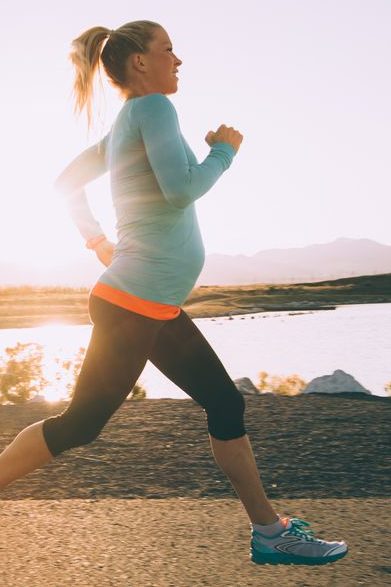If you’re in good health and your pregnancy is uncomplicated, the answer is usually yes. Some women, however, have medical conditions or pregnancy complications that mean they should not exercise at all. Check with your healthcare provider before starting to run – or do any kind of exercise – during pregnancy.
If your provider gives you the green light, the key is to listen to your body – don’t push yourself beyond your limits. Women who ran regularly before getting pregnant can usually continue running at their normal pace for as long as it feels comfortable.
If you’re new to running, however, start slowly: Warm up for five to 10 minutes by stretching and walking, then jog at a slow and easy pace for about five minutes, and cool down by walking for another five to 10 minutes.
If your joints don’t hurt and if you feel ready for more, you can gradually pick up the pace or increase your distance by a small amount each week. The recommended goal for pregnant women is at least 20 to 30 minutes of exercise at moderate intensity on all or most days of the week.
Keep in mind that it’s important to stay cool while exercising. Avoid jogging in hot or humid weather because pregnant women tend to overheat more easily. Also, whether you’re a new runner or a veteran, you’ll probably need to modify your running routine later in pregnancy to accommodate your growing belly.
Read on for tips to help you safely incorporate jogging into your pregnancy exercise routine.
Running tips for the first trimester
- Stay hydrated. Drink lots of water before, during, and after your run. One way to monitor your hydration is to weigh yourself before and after a run. Any weight loss is fluid and should be replaced by drinking enough water afterward to bring your weight back up to the original number by your next workout.
Another way to monitor your hydration is to check the color of your urine – if it’s dark yellow, you need to drink more. Urine should be pale yellow to nearly clear.
Tip: Plain water is best, but if you use an electrolyte replacement sports drink, dilute it to cut the sugar content – two parts water to one part sports drink. - Stay cool. Wear loose-fitting clothing made of light, breathable material to help you stay cool.
- Protect your skin. Wear a hat with a brim to prevent or minimize melasma (pregnancy related skin darkening). Always use a broad spectrum sunblock with SPF 30 or higher on all exposed skin.
- Wear proper shoes. Your shoes should give your feet plenty of support, especially around the ankles and arches. Look for running shoes that are cushioned for shock absorption and are flexible at the ball of the foot. Make sure you get shoes that fit well . You may also want to swap out the liner with a gel liner for better shock absorption.
- Wear a supportive bra. Invest in an adjustable, supportive sports bra that can expand with your growing breasts.
Running tips for the second trimester
- Be careful about changes in balance. Your center of gravity is shifting as your belly grows, leaving you more vulnerable to slips and falls. Avoid running on trails with debris, rocks, tree roots, and other natural obstacles that could cause a fall. Run on pavement to play it safe.
- Consider your running path. Some pregnant women prefer the straight lines of a long running path because running straight without having to make any turns feels more comfortable on the joints. Other women don’t mind turns and prefer to run on a track because the surface can be easier on the knees. Regardless of the type of trail you choose, make sure you’re in a safe area, not a remote spot where you could become stranded in an emergency. Always carry your phone.
- Support your growing belly. If the bouncing motion of running is becoming uncomfortable, try wearing a belly support band.
Running tips for the third trimester
Continue to be as careful as you were during the first two trimesters. And remember: If you feel too tired to go for a run, listen to your body and take a break. Pushing yourself too hard can be harmful. Most runners find that their pace slows down considerably during the third trimester – a fast walk may be a better choice as your due date approaches.
Source: Baby Center





